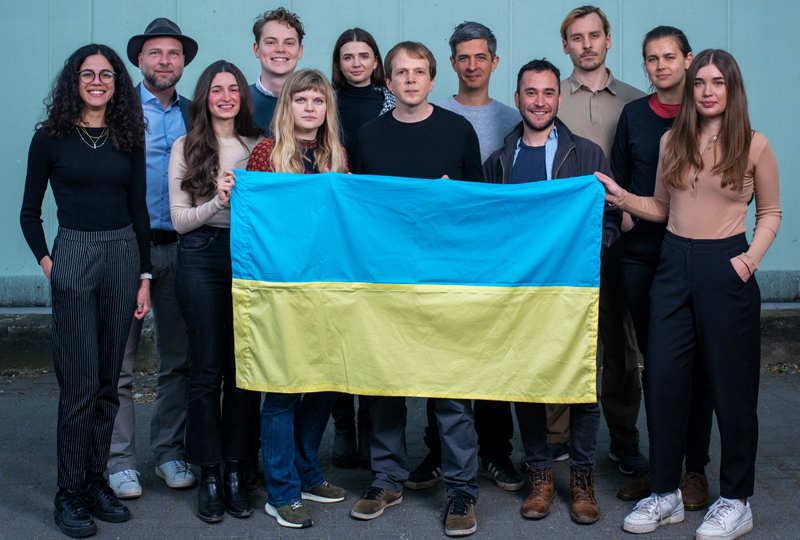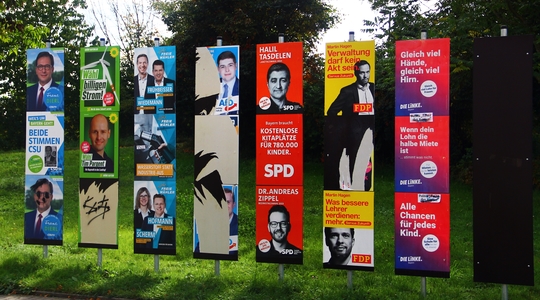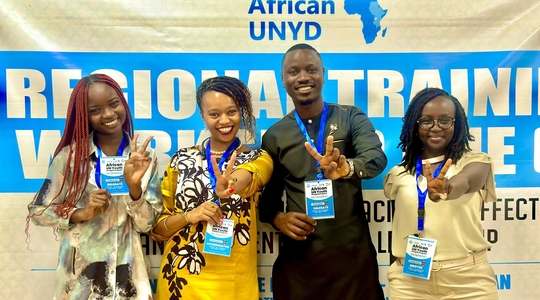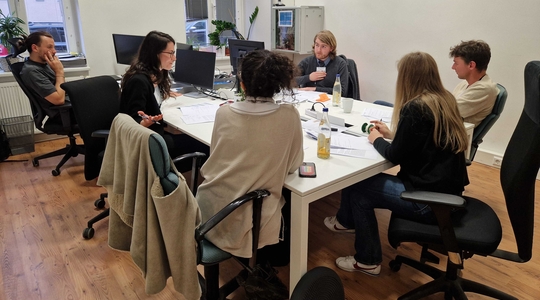24 February 2022 was a Thursday and I had arranged to meet my colleagues from CRISP e.V. for a drink after work. Because Russia started the large-scale attack on Ukraine on that day, we couldn't go through with the plan. Instead, we met at the Brandenburg Gate in Berlin, where people came together to show solidarity with Ukraine, or simply because they couldn't stay at home alone with their emotions. Since that day, as a Ukrainian, I feel constant support from my international team, in organising humanitarian aid, supportive talks and joint projects. In this article, I share how we, as a relatively small non-profit organisation, are responding to the large-scale war in the middle of Europe and what developments we are seeing.
As an association that is active both internationally and in Germany on the topics of conflict transformation, political education, participation and communication processes, we considered where we could best support with our capacities and knowledge. At first we organized a donation campaign and bought protective vests, which were not available in Ukraine. Even though we are not a humanitarian organization, we can help well if, for example, Ukrainian organizations need partners in Germany who can provide a donation account or issue donation receipts. Since we have three Ukrainians in our team, we organized online events right in March where people could ask questions about Ukraine in a low-threshold way - that was the beginning of our engagement for the German-Ukrainian dialogue. We are also active in capacity building for Ukrainian associations in Germany, teachers in Germany and Ukraine, and networking of relevant actors.
Similar to 2015, large parts of German society reacted with humanity and empathy to the arrival of the war refugees. The reception and arrival of the refugees could ultimately be managed thanks to the enormous commitment of civil society, be it in finding accommodation and school places, in dealing with the authorities or even psychological support. Voluntary refugee helpers relieved the state of a large part of the work. They were usually not prepared for this task, which often led to frustration and conflicts.
In response to this challenge, we implemented a support programme for refugee volunteers with funding from the German Foundation for Commitment and Volunteering. This allowed us to visit the municipalities and talk to both volunteers and people who have been granted temporary protection in Germany and to get to know their needs better. We have been able to respond directly to some of these needs, while others require more capacity and strategic action.
Communication: Emotions
Especially in rural regions, close friendly relationships often develop between volunteers and refugees. It is a well-known fact that language can be a difficult barrier to integration. 2022 has responded to this throughout Germany with a significant increase in the number of language courses on offer, (source : ) even if some are initially run without recognition as integration courses. At the same time, there is a lot of interest in the Ukrainian language in Germany. According to the report of the free online language acquisition provider "Duolingo", in 2022 the number of Ukrainian learners in Germany increased by 1651% (Duolingo Language Report 2022: https://blog.duolingo.com/de/der-duolingo-sprachbericht-2022-gesamtbericht/ ). Ukrainian courses in presence can now also be found more often at adult education centers or private language schools. The number of and interest in Ukrainian events is higher than ever in Germany. In my view, these developments can have very positive effects, since integration functions as a "two-way street" in the sense that both the newcomers and the host society open up. Without mutual interest in coexistence and appreciation of cultures, no heterogeneous society will function.
The other challenge in German-Ukrainian communication is dealing with the war and the emotions associated with it.
"I am not a certified German teacher, but the need to learn German was already high among the refugees from Syria and I led a language course in 2015/16. With this experience, we were able to start a language course for refugees from Ukraine as early as April 2022. People who attend my weekly course are now good friends of mine. But we don't bring up the subject of the war. I see when they are sad or nervous, but I don't ask them further because I don't want to impose myself. If some of the refugees' requests become too much for me, I seek help from other volunteers, but I find it complicated to talk about my limits."
Melanie Cassel, Baddeckenstedt
Communication: social-political
At the same time, we observe how solidarity with Ukraine is decreasing in parts of the population of Germany. The number of protests against rising inflation, the increase of energy prices, sanctions against Russia and for a new deal with the aggressor are increasing, e.g. at the Monday demonstrations in Frankfurt (Oder) and Thuringia. Participants often claim not to be heard or seen by their government and tend to blame Ukrainians for current socio-political developments and threats to peace and security in Europe. Extremist positions are mixed with those of parts of the peace movement, as well as with a general dissatisfaction with the political system and its representatives. The role of Russian and Russian-sponsored propaganda in these developments should not be underestimated.
The need for measures against radicalisation, disinformation, neo-imperialism and for German-Ukrainian dialogue is growing every day. Inclusive dialogue formats are needed that enable people of German and Ukrainian origin to openly discuss socio-political issues. Such formats need good moderation, high tolerance and sensitivity on the part of all those involved.
We organised one such dialogue format together with the Alliance of Ukrainian Organisations, Kyiv Talks and VOLT Germany in a pub in Dresden. After a panel discussion, the question and answer session was opened. Even though this worked well thanks to skilful moderation, we can experiment with the format in the future and make it more open to enable an even deeper exchange.
In Ukraine-related events and publications, it is important to include Ukrainian migrant self-organisations true to the motto "Nothing for the target group without their participation". Although the need to make debates de-colonised, inclusive and without "West-splaining" is widely known, events that analyse, for example, future scenarios of the Russian war in Ukraine often take place without experts from Ukraine. The explanation for this can be, for example, "We achieve a factual discussion among German experts away from emotions", according to which the Ukrainian experts are fundamentally denied expertise and objectivity.
Migrant self-organisations - not only Ukrainian ones - mostly function on a voluntary basis and need professionalisation. This is another field that should be worked on in a multicultural society.
Security
As refugees from Ukraine are particularly often accommodated privately, their safety cannot be so easily guaranteed. Since 2015, many municipalities have developed violence protection concepts in which security measures are laid down based on the needs and capacities of the respective municipality. However, these concepts are based on the fact that refugees live in collective accommodation and can react differently to existing risks (e.g. security forces and therapy offers in the accommodation) than now in private accommodation. Even though security in collective accommodation remains a very complex issue with its own challenges, there is a need to extend the concepts to private accommodation. In my view, it is worthwhile to anchor the following measures:
- Disseminate information among new arrivals about what options are available if one has been a victim of or witness to violence;
- Language mediators at the police;
- Regular round tables on security with municipal decision-makers and local civil society;
- Include trained psychologists from Ukraine as counsellors as long as their diplomas have not been recognised.
„I am a psychologist from Ukraine, in Germany since March 2022. Although my diploma is not yet recognised here, many refugees turn to me for psychological support. Often they are worried about relatives in Ukraine. The issue of security in Germany is also widespread - there are cases of cash being stolen from the suitcases of refugees in host families; slashed tyres on cars with Ukrainian licence plates; questionable cars stopping regularly at the houses where refugee women with children live. Some victims contacted the police, but the report was not filed or not investigated further, or they could not communicate at all because of the language barrier."
Anonymous (the person wishes to remain anonymous)
Security-related issues need a municipal approach - cooperation between the administration and civil society is very important here. Especially when solidarity with refugees decreases, one must not lose sight of the control over security and must act preventively.
Pedagogical support
According to the Conference of Ministers of Education and Cultural Affairs, more than 200,000 children and young people from Ukraine have started school in Germany since 24 February 2022 (source: https://www.kmk.org/dokumentation-statistik/statistik/schulstatistik/gefluechtete-kinderjugendliche-aus-der-ukraine.html ). Each federal state has reacted to this in its own way - with mixed welcome classes, classes with teachers and pupils from Ukraine only, direct integration into regular classes, etc. Many children learn at the German and Ukrainian schools in parallel. Despite the criticism that the children are overtaxed, this phenomenon remains widespread. The following reasons were given to us by pupils, their parents and teachers in Ukraine:
- The families plan to return to Ukraine in the near future and are worried that their learning at the German school will not be recognised.
- The students feel disconnected from everything Ukrainian and have no opportunity to talk to people who share their views on the situation in Ukraine.
- Ukrainian children are often left out of the teaching programme until they have learned German. Children lose self-esteem and look for recognition opportunities.
„Some of my students are now in Germany, but we stay in touch, in the online school, in the projects of Ukrainian NGOs or informally. I often hear that they feel lonely and more grown up than their German comrades. They can't talk about their experiences, don't want to or can't trust new acquaintances. I think socio-educational projects could help them, but not those that aim at assimilation (I've heard about those), but the projects that keep the connection to Ukraine. Personally, I don't want to lose the young people for Ukraine."
Nataliya Ponezha, Perschotrawensk, Ukraine
So there is a need for offers for refugee children where they do not feel reduced to their language skills alone, but where they come into contact with children with similar experiences of flight and possibly homesickness. It is important to involve teachers and civil society from Ukraine in such programmes, because the expertise for trauma-sensitive education projects in Ukraine is very large and has been greatly professionalised since the beginning of the Russian invasion in 2014.
It is also necessary to support German teachers in dealing with the topic of war in heterogeneous classes. Many find it challenging to respond to students' emotions and political statements, but also do not find it appropriate to ignore or stop them. Ukrainian teachers who have been employed at schools in Germany for a longer period of time or only recently are approached as conflict advisors and psychological counsellors when dealing with children from Ukraine, Georgia, the Republic of Moldova or Russia. Support for teachers in Germany in dealing with these challenges is urgently needed.
"It is great how much support we get from Germany. I came from Kharkiv with my mother in August 2022 and we were distributed to Giessen. Here we have our own room, I go to school, mom attends a language course. It's safe here, I can meet people, go for a walk - I couldn't do that at home, I had to sit in the shelter all the time. Here in Giessen we have a club for Ukrainians, where they play board games every Thursday, and there are other great offers for young people. It is a "safe space" for us, here I can talk to those who have had a similar experience, here I can talk in my mother tongue and relax. It is important to have such places. I never thought that the war would start, that I would live here and speak German, but that's how it is now. Someday I'll study journalism in Spain, but first I'm going to my high school graduation party in peaceful Ukrainian Kharkiv. That's what's going to happen. I know it."
Karolina Daushvili, 13 years old, Giessen
Fazit
German-Ukrainian relations have never been as intense as they are today. There is a statement that "Berlin is the new Kyiv" because so many active professional Ukrainians have moved here. It is worthwhile to draw on the expertise that many representatives of Ukrainian civil society have brought with them to Germany, especially their experience with interculturality and dealing with the challenges of war. Ukrainian civil society - both in exile and in Ukraine - has known about the war in their homeland since 2014, and has accordingly already developed, applied and tested many approaches. Ukraine also has a lot of experience in the field of digitalization, modernization of education and intersectoral cooperation in reform processes, which can be relevant in Germany. While we are fighting together in this cruel war in the middle of Europe, we also have a momentum from which both societies can emerge even stronger. In concrete terms, this means inviting Ukrainian experts to the Ukraine-related debates, building partnerships with Ukrainian NGOs so that capacity building also has an impact in Germany. Above all, it means listening before making statements about what Ukraine should do and how. It is up to German civil society to recognize the momentum and not miss it.
By Kateryna Pavlova, who comes from Ukraine and works for CRISP e.V. as Senior Project Coordinator.



